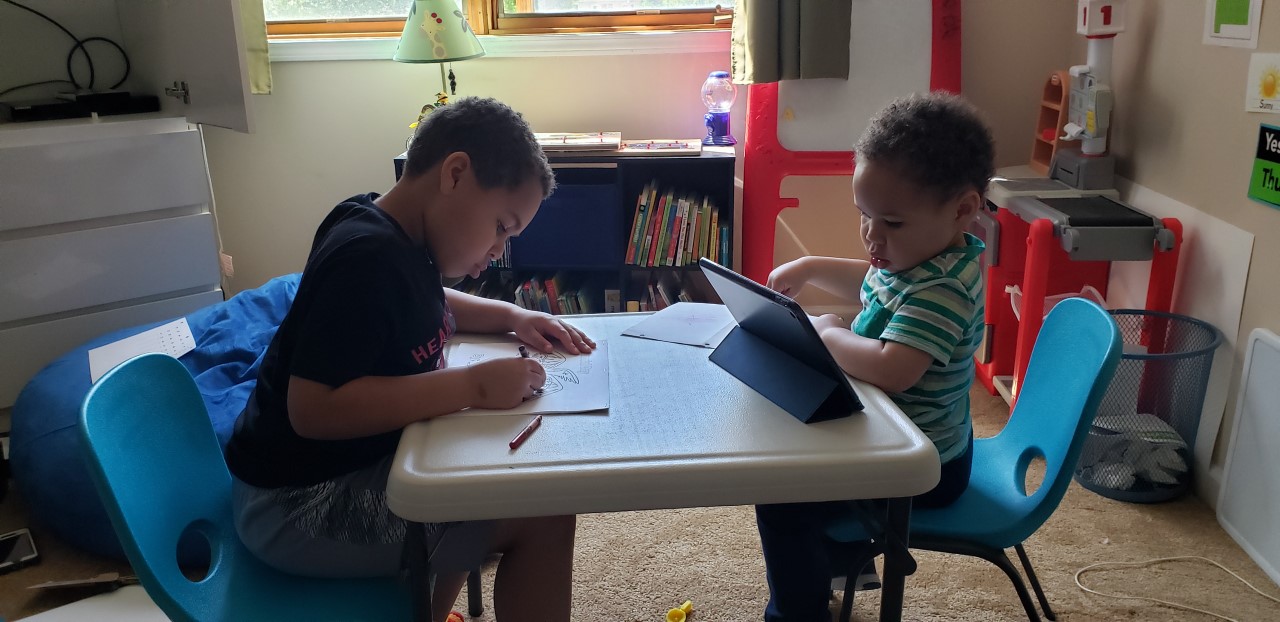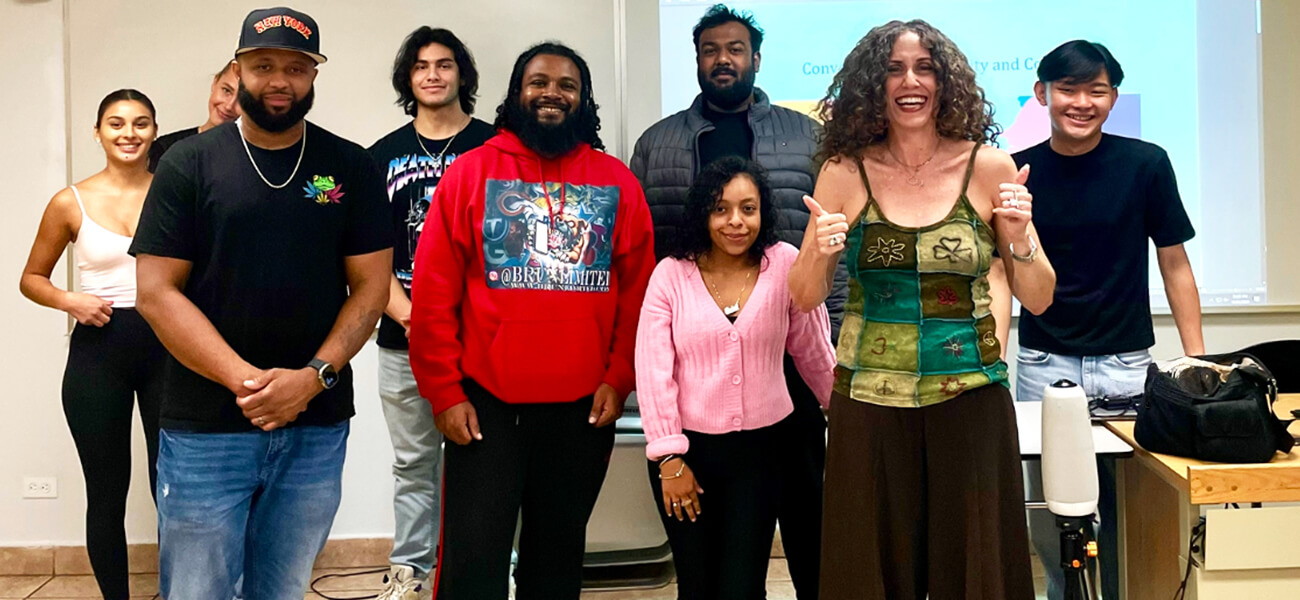Berkeley professors maintain high standards of education and family life, despite unusual circumstances
Berkeley College has been a leader in online education for more than two decades. And most of the College’s 5,700+ students were already taking at least one online class even prior to the COVID-19 outbreak that shut down physical campuses at colleges nationwide. We recently took a look at the temporary transition to all-online classes from the perspective of Berkeley’s renowned faculty, some of whom are teaching online classes for the first time.
Preparation has made the difference
Andrew Gallinger, a Humanities professor teaching online for the first time, pointed out that Berkeley was well prepared for the temporary transition to all-online learning. “The administration and department chairs have been great, very supportive. And the fact that the infrastructure and technology were already established made the transition even smoother.”
Professor Gallinger’s family has a close-up view of many different perspectives of online learning—on the college, high school, and elementary school levels. He has taught at Berkeley for more than 11 years, mainly at the Woodbridge, New Jersey campus. His wife is a high school Science teacher, and his 11-year-old son is adjusting to online fifth grade learning.
An opportunity to create even stronger teaching and learning
He does see many positive aspects to the temporary transition to all-online learning. “I think we’re going to see the world moving more toward online learning,” he said. “And I think it will make us stronger in the long run. We’ll re-focus on what’s most valuable. We’re learning to learn in new ways. We’re learning to be more self-disciplined. I think teachers will become even stronger teachers, and students will become even stronger learners. I think we’ll create opportunities we don’t even see yet.”
While it’s still early in the semester, Professor Gallinger has been constantly reminding students that they can still reach out for extra help and personal attention while taking online classes and to join in on discussions with professors and classmates.
Exceptional support has also been critical
Adjunct Professor Dennis Raptis from the New York City campus, who also works as a therapist, agreed that Berkeley has done an outstanding job of accommodating students during this challenging time. “The support system works very well for both students and faculty,” he said. Living in Manhattan with his wife and children (in grades one and four), he makes it a priority to keep both his professional and personal commitments on schedule.
Maximizing opportunities for innovation
According to Dr. Melissa Baralt, who’s been teaching Berkeley for 11 years, “The main thing is that we’re concentrating on doing right by our students.” Dr. Baralt had previously taught on-site classes and has been adjusting to working from home while caring for her children ages seven and three. She emphasized her efforts to maintain a “human connection” during the transition to all-online classes. “Anyone who knows me knows that I’m all about interacting with my students,” she said. “So, I’ve gotten more innovative and more creative with my teaching. I have a one-hour Zoom call with each class every week. We’re leveraging the available technology and getting even more detailed with our assignments, adding even more links to resources, and using new applications. For example, we’re using Flipgrid to engage and empower students by allowing them to share their videos. They’ve really responded very favorably to it, it’s added a new dimension to class.”
The importance of managing time
Time management has been critical for Dr. Baralt. She makes time for students in each of her classes while also making sure to spend time with her first-grade son. “I’m using positive reinforcement with my son,” she pointed out. “We’re working on his lessons and trying to keep them fun. We do art projects and interactive activities. I’ve even had him watch videos with the sound off and the captions on, so that he can work on his reading skills.”
Maintaining personal attention
Dr. Baralt also noted that it’s important to be flexible and understanding with her students. “I’m careful to maintain that human connection and be sensitive to any issues the students have in their personal lives. This is affecting everyone and we need to work together.”
Important advice for students
Liberal Arts Professor Joline Peters has taught courses such as Psychology, Social Sciences, and Ethics at Berkeley College since 2014. She’s now adjusted to online instruction from her home in Brooklyn where she lives with her husband and son. “I’m proud of the way students have adjusted,” said Professor Peters. “My advice to students is to remember to communicate. Reach out for help right away if you need it. Be understanding to others and also be kind to yourself.”
Creating a balance between professional and personal responsibilities
Also teaching online for the first time at Berkeley is Professor Antoinette Morales, who has taught classes at the Woodland Park, Newark, Paramus, and Woodbridge campuses. “Developing a routine is important,” according to Professor Morales, who lives with her husband, high school-aged daughter, middle school-aged son, and infant son. “Shifting responsibilities has helped us create a balance between work and personal time.” She has observed positive aspects of the temporary change to all-online learning, pointing out that, “There was ample time to prepare for the transition. Familiarity with Canvas was also very beneficial for everyone. We’re also really enjoying having more family time and less driving from place to place.”
Leveraging technology
Dr. Byron Hargrove, a Humanities professor and Director of the Berkeley College Honors Program, also remarked that the transition to all-online classes was extremely fluid. “In addition to the infrastructure, the training we receive has been excellent,” he commented. “As professors, we’re taking extra care to respond to students quickly. I’ve developed a good routine with my classes and we’re using Zoom for meeting during office hours.”
Dr. Hargrove is the father of a 21-year old Berkeley College senior, as well as two younger children, ages two and six. “My oldest son misses living in the residence halls at the White Plains campus,” he said. “But he’s adjusted well to online learning.”

Opportunities for innovation
Another innovative aspect of the current situation will be the upcoming Honors Symposium according to Dr. Hargrove. For the first time, it will be held online. “We’ve made adjustments and we’re quite excited about the opportunity,” he said. “Instead of the traditional poster presentations, the Honors students will be making PowerPoint presentations. We’ll even be able to conduct ‘breakout rooms’ on Zoom and the moderator will be able to gather everyone back for the closing. It will be different, but I think it will offer the students a chance for a very valuable experience.”
Learning important skills for the future
“Another positive aspect of all this is that students are developing skill sets which will be very valuable in the future,” Professor Gallinger observed. “Many students are likely to have jobs in the future where they will work remotely and this is great preparation for that. They’re learning to put their questions in writing and work in groups remotely, which will be much more common in the professional world as we move forward.”
Please visit our Domestic Viewbook for additional information for prospective students. For up-to-date and detailed information, please visit BerkeleyCollege.edu and view our catalogs at BerkeleyCollege.edu/publications.





